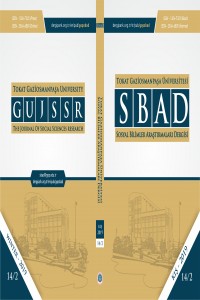Öz
"Men Who March Away (Song of the Soldiers)"
was written by Thomas Hardy, a poet who had never experienced the war
first-hand. Alongside other famous authors of the age, he was asked by the
British Government to contribute to the work of the War Propaganda Bureau by
writing patriotic poems celebrating the British soldier, and at a meeting held
in Wellington House in London, Hardy along with other British poets became
attached to the British propaganda. “Men Who March Away (Song of the Soldiers)”
was published on 9th September, just a week after the authors’ meeting at
Wellington House. The poem that has two titles which are “Men Who March Away”
and “Song of the Soldiers” and two intentions, presents us with the perspective
of a soldier and an onlooker simultaneously. If one reads the speaker as a
soldier, the writing becomes a manipulative propagandist poem; by contrast,
understanding the speaker as an onlooker changes the style and reproduces the
poem as an example of anti-war writing. In this article, I will apply Mikhail
Bakhtin’s theory of “double voiced discourse” to highlight the simultaneously
contrasting messages of the poem.
Anahtar Kelimeler
The First World War War Poetry Propaganda Protest Thomas Hardy
Kaynakça
- Perkins, D. (1976). A History of Modern Poetry: From the 1890s to the High Modernist Mode, Cambridge, MA: Belknap.
- Walter, G. (2006). The Penguin Book of First World War Poetry, London:Penguin Classics.
- Gifford, D. (1995). "Soldier Poets (1914-1918)", Hungarian Journal of English and American Studies (HJEAS), 1(2), 47-63. Retrieved from http://www.jstor.org/stable/41273896
- Kendall, T. (2013). Poetry of the First World War, Oxford: Oxford University Press.
- Owen, D., &Pividori, C. (2016). Writings of Persuasion and Dissonance in the Great War That Better Whiles May Follow Worse, Leiden: Brill Rodopi.
- Millgate, M. (2006). Thomas Hardy: A Biography Revisited, Oxford: Oxford University Press.
- Holquist, M. (1981). Dialogic Imagination: Four Essays by M.M. Bakhtin, University of Texas Press.
- Fussell, P. (2000). The Great War and Modern Memory, New York: Oxford University Press.
Öz
"Men
Who March Away (Song of the Soldiers)” savaşı hiç deneyimlememiş olan Thomas
Hardy tarafından yazılmış bir şiirdir. Çağının diğer şairleri gibi Hardy de,
İngiliz askerini öven vatansever şiirler yazarak katkıda bulunmak üzere, Savaş
Propaganda Bürosunun çalışmalarına hükümet tarafından davet edilmiştir. Böylece
Londra Wellington House'da düzenlenen bir toplantıda, diğer İngiliz şairler ile
birlikte İngiliz propagandasının bir parçası olmuştur. “Men Who March Away
(Song of the Soldiers)” , Wellington House'da yapılan toplantıdan sadece bir
hafta sonra 9 Eylül'de basılmıştır. “Men Who March Away” ve “Song of the
Soldiers” adlarında iki başlığı ve iki ayrı amacı olan bu şiir bize aynı anda
hem askerin hem de askeri uzaktan izleyenin bakış açısını yansıtır. Eğer
anlatıcıyı bir asker olarak görürsek, bu eser propaganda yapan bir şiire
dönüşür. Oysaki anlatıcıyı dışardan gözlemleyen biri olarak görmek, şiirin
tarzını değiştirir ve onu savaş karşıtı bir eser olarak baştan yaratır. Bu makalede, Mikhail Bakhtin'in "çift
sesli söylem" kuramını, bir şiirin aynı anda karşıt mesajlar içerdiğini
vurgulamak için kullanacağım.
Anahtar Kelimeler
Kaynakça
- Perkins, D. (1976). A History of Modern Poetry: From the 1890s to the High Modernist Mode, Cambridge, MA: Belknap.
- Walter, G. (2006). The Penguin Book of First World War Poetry, London:Penguin Classics.
- Gifford, D. (1995). "Soldier Poets (1914-1918)", Hungarian Journal of English and American Studies (HJEAS), 1(2), 47-63. Retrieved from http://www.jstor.org/stable/41273896
- Kendall, T. (2013). Poetry of the First World War, Oxford: Oxford University Press.
- Owen, D., &Pividori, C. (2016). Writings of Persuasion and Dissonance in the Great War That Better Whiles May Follow Worse, Leiden: Brill Rodopi.
- Millgate, M. (2006). Thomas Hardy: A Biography Revisited, Oxford: Oxford University Press.
- Holquist, M. (1981). Dialogic Imagination: Four Essays by M.M. Bakhtin, University of Texas Press.
- Fussell, P. (2000). The Great War and Modern Memory, New York: Oxford University Press.
Ayrıntılar
| Birincil Dil | İngilizce |
|---|---|
| Bölüm | Makaleler |
| Yazarlar | |
| Yayımlanma Tarihi | 31 Aralık 2019 |
| Gönderilme Tarihi | 21 Temmuz 2019 |
| Kabul Tarihi | 22 Ekim 2019 |
| Yayımlandığı Sayı | Yıl 2019 Cilt: 14 Sayı: 2 |
Kaynak Göster

Bu eser Creative Commons Atıf 4.0 Uluslararası Lisansı ile lisanslanmıştır.


